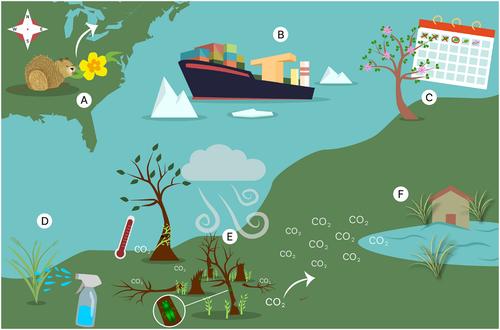当前位置:
X-MOL 学术
›
Glob. Change Biol.
›
论文详情
Our official English website, www.x-mol.net, welcomes your
feedback! (Note: you will need to create a separate account there.)
Climate‐Smart Invasive Species Management for 21st Century Global Change Challenges
Global Change Biology ( IF 10.8 ) Pub Date : 2024-10-24 , DOI: 10.1111/gcb.17531 Eva M. Colberg, Bethany A. Bradley, Toni Lyn Morelli, Carrie J. Brown‐Lima
Global Change Biology ( IF 10.8 ) Pub Date : 2024-10-24 , DOI: 10.1111/gcb.17531 Eva M. Colberg, Bethany A. Bradley, Toni Lyn Morelli, Carrie J. Brown‐Lima

|
Addressing the global challenges of climate change and biotic invasions requires understanding their interactions and implications for natural resource management. To facilitate and support invasive species management in a changing climate, we review how climate change and invasions interact to impact the planning, action, and outcomes of invasive species management. Climate change is facilitating the introduction of new potential invasive species and altering pathways of introduction and spread, with implications for which species natural resource managers need to assess, monitor, and target. Climate‐driven shifts in invasive species phenology require more flexible management timelines. Climate change may reduce the efficacy and feasibility of current treatment methods and make native ecosystems more vulnerable to invasion. Additionally, disturbance caused by extreme climate events can compound the spread and impacts of biological invasions, making invasive species management a necessary part of extreme event preparation and response planning. As a solution to these challenges, we propose climate‐smart invasive species management, which we define as the approaches that managers and decision‐makers can take to address the interactive effects of climate change and invasions. Climate‐smart invasive species management includes considering potential shifts in species ranges, abundances, and impacts to inform monitoring, treatment, and policies to prevent new invasive species. Climate‐smart management may also involve adjusting the timing and type of treatment to maintain efficacy, promoting resilient ecosystems through climate‐smart restoration, and considering the effects of climate change when setting management goals. Explicitly considering the interactions of climate change and biological invasions within organizational decision‐making and policy can lead to more effective management and promote more resilient landscapes.
中文翻译:

应对 21 世纪全球变化挑战的气候智能型入侵物种管理
应对气候变化和生物入侵的全球挑战需要了解它们的相互作用和对自然资源管理的影响。为了在不断变化的气候中促进和支持入侵物种管理,我们审查了气候变化和入侵如何相互作用以影响入侵物种管理的规划、行动和结果。气候变化正在促进新的潜在入侵物种的引入,并改变引入和传播的途径,从而影响自然资源管理者需要评估、监测和确定哪些物种。气候驱动的入侵物种物候变化需要更灵活的管理时间表。气候变化可能会降低当前处理方法的有效性和可行性,并使本地生态系统更容易受到入侵。此外,极端气候事件造成的干扰会加剧生物入侵的传播和影响,使入侵物种管理成为极端事件准备和响应计划的必要组成部分。作为应对这些挑战的解决方案,我们提出了气候智能型入侵物种管理,我们将其定义为管理人员和决策者可以采取的方法,以应对气候变化和入侵的相互作用。气候智能型入侵物种管理包括考虑物种范围、丰度和影响的潜在变化,为预防新入侵物种的监测、处理和政策提供信息。气候智能型管理还可能涉及调整处理的时间和类型以保持疗效,通过气候智能型恢复促进有弹性的生态系统,以及在设定管理目标时考虑气候变化的影响。 在组织决策和政策中明确考虑气候变化和生物入侵的相互作用可以带来更有效的管理并促进更具弹性的景观。
更新日期:2024-10-24
中文翻译:

应对 21 世纪全球变化挑战的气候智能型入侵物种管理
应对气候变化和生物入侵的全球挑战需要了解它们的相互作用和对自然资源管理的影响。为了在不断变化的气候中促进和支持入侵物种管理,我们审查了气候变化和入侵如何相互作用以影响入侵物种管理的规划、行动和结果。气候变化正在促进新的潜在入侵物种的引入,并改变引入和传播的途径,从而影响自然资源管理者需要评估、监测和确定哪些物种。气候驱动的入侵物种物候变化需要更灵活的管理时间表。气候变化可能会降低当前处理方法的有效性和可行性,并使本地生态系统更容易受到入侵。此外,极端气候事件造成的干扰会加剧生物入侵的传播和影响,使入侵物种管理成为极端事件准备和响应计划的必要组成部分。作为应对这些挑战的解决方案,我们提出了气候智能型入侵物种管理,我们将其定义为管理人员和决策者可以采取的方法,以应对气候变化和入侵的相互作用。气候智能型入侵物种管理包括考虑物种范围、丰度和影响的潜在变化,为预防新入侵物种的监测、处理和政策提供信息。气候智能型管理还可能涉及调整处理的时间和类型以保持疗效,通过气候智能型恢复促进有弹性的生态系统,以及在设定管理目标时考虑气候变化的影响。 在组织决策和政策中明确考虑气候变化和生物入侵的相互作用可以带来更有效的管理并促进更具弹性的景观。


















































 京公网安备 11010802027423号
京公网安备 11010802027423号